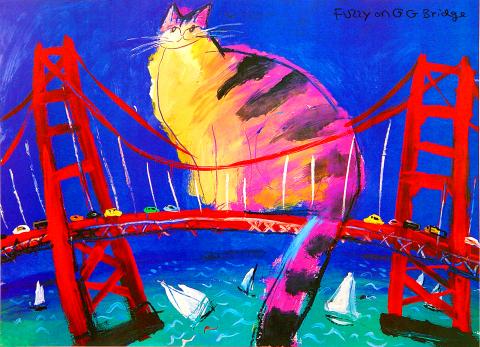An Odyssey of Dreams (童夢) starts off with a dark tone, as main subject Michael Leu (呂游銘) describes a recurring nightmare where he is being chased.
“I committed a serious crime, and they want to catch me,” he says, as he walks through a desolate landscape in the US, where Leu, a former interior designer and illustrator, emigrated to at age 33 to make it as an artist.
But much of the documentary, directed by Lai Chun-yu (賴俊羽), including the strings-and-piano driven soundtrack, is playful and whimsical, seemingly to match Leu’s personality and colorful art that mostly features cats of various sizes.

Photo courtesy of White Crane Films
Shot between 2011 and last year, there’s no clear timeline throughout the entire film as we can only vaguely detect which events happened in which order by the length of Leu’s hair. Within the first 20 minutes or so, we jump from Leu driving through the American West to him talking about his cat at his California home, then to his wife talking about how they met in Taiwan, and finally back on the road without clarifying whether it was the same road trip.
But this disorder does not detract from the film. Rather, it is more of an abstract but informational way of directing the audience’s attention on Leu as a person and not so much about the events that take place. The dialogue mostly takes the form of Leu’s stream-of-consciousness musings while he snaps photos of seagulls or sets up a booth at an art show, while we hear the more structured bits from other characters such as his family members and childhood friends.
From imitating a tiger’s roar to attract the attention of deer for a photograph, then analyzing the effectiveness of his action to simply describing a window in his house, Leu is always intriguing and endearing, and as a result the film has very few dull moments. It’s not all fun and games, though, as Leu also talks about his past, his work ethic, and his determination to make it in America.

Photo courtesy of atmovies.com
Another element that makes the format work is the transitions, as there is always a substantial set-up to a certain topic, often with bits that show more of Leu’s personality and life story. Some of these seem like devices to incorporate interesting but perhaps otherwise irrelevant shots into the film, but they help make the randomness less jarring. For example, there’s a long scene of Leu riding the subway in New York and snapping photographs in Times Square before we get to him visiting and interacting with his parents — and even that is a transitional device as then the camera turns to a family photo in the parents’ house, which leads the real topic at hand — Leu’s children.
The film’s tone changes about two-thirds into the film, as the audience probably has a good idea of who Leu is by then. The topics become more serious as Leu addresses his demons mentioned in the opening scene, and there is now a storyline going on as the scenes become longer and start following a chronological order.
At this point, the film starts featuring fantastic animations of Leu’s drawings and paintings to go with the narrative, which is director Lai’s forte as he was part of the team that won a Golden Horse for best visual effects with the 2007 film, Secret (不能說的秘密). It also starts employing a variety of fun effects such as adding a microphone echo to Leu’s voice when he recites a speech by his elementary school principal.
One may lament that Lai did not incorporate these flourishes earlier in the film, but since they are not Leu’s creations, perhaps they would have taken away from the sole focus on him and his work.

On April 26, The Lancet published a letter from two doctors at Taichung-based China Medical University Hospital (CMUH) warning that “Taiwan’s Health Care System is on the Brink of Collapse.” The authors said that “Years of policy inaction and mismanagement of resources have led to the National Health Insurance system operating under unsustainable conditions.” The pushback was immediate. Errors in the paper were quickly identified and publicized, to discredit the authors (the hospital apologized). CNA reported that CMUH said the letter described Taiwan in 2021 as having 62 nurses per 10,000 people, when the correct number was 78 nurses per 10,000

As we live longer, our risk of cognitive impairment is increasing. How can we delay the onset of symptoms? Do we have to give up every indulgence or can small changes make a difference? We asked neurologists for tips on how to keep our brains healthy for life. TAKE CARE OF YOUR HEALTH “All of the sensible things that apply to bodily health apply to brain health,” says Suzanne O’Sullivan, a consultant in neurology at the National Hospital for Neurology and Neurosurgery in London, and the author of The Age of Diagnosis. “When you’re 20, you can get away with absolute

May 5 to May 11 What started out as friction between Taiwanese students at Taichung First High School and a Japanese head cook escalated dramatically over the first two weeks of May 1927. It began on April 30 when the cook’s wife knew that lotus starch used in that night’s dinner had rat feces in it, but failed to inform staff until the meal was already prepared. The students believed that her silence was intentional, and filed a complaint. The school’s Japanese administrators sided with the cook’s family, dismissing the students as troublemakers and clamping down on their freedoms — with

As Donald Trump’s executive order in March led to the shuttering of Voice of America (VOA) — the global broadcaster whose roots date back to the fight against Nazi propaganda — he quickly attracted support from figures not used to aligning themselves with any US administration. Trump had ordered the US Agency for Global Media, the federal agency that funds VOA and other groups promoting independent journalism overseas, to be “eliminated to the maximum extent consistent with applicable law.” The decision suddenly halted programming in 49 languages to more than 425 million people. In Moscow, Margarita Simonyan, the hardline editor-in-chief of the